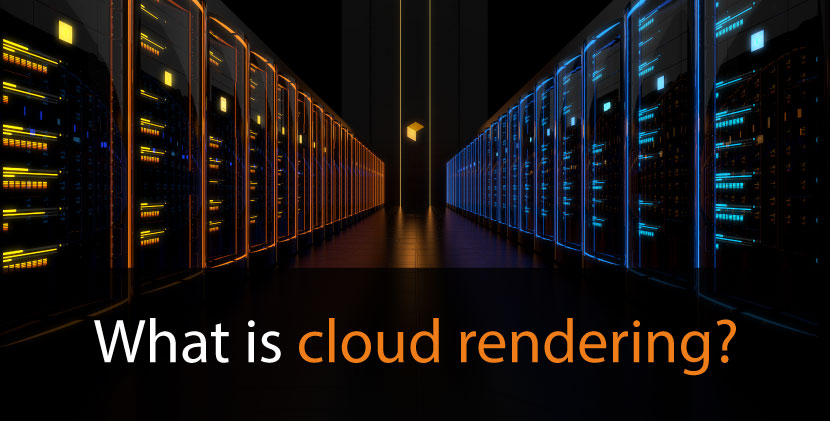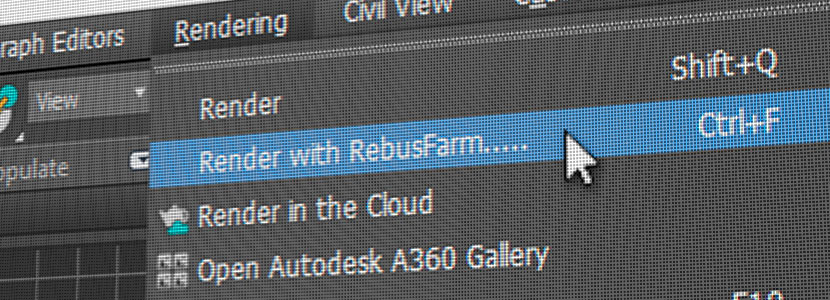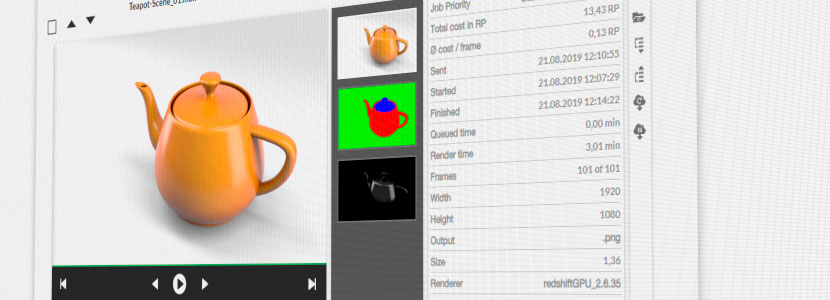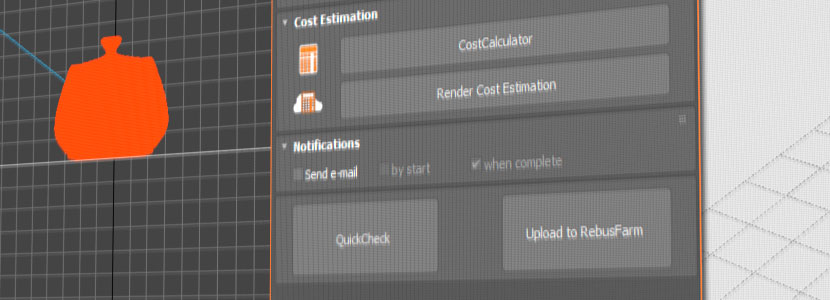
Cloud rendering is the process of calculating 3D images/animations on a render farm which is incredibly faster than rendering on a single computer system. These render farms are specialized in the calculation of computer generated images (CGI). Next to the speed, rendering on the cloud has further benefits. In this article, we'll explore the cloud rendering meaning, how it works, and why it’s becoming the go-to choice for 3D professionals.
Say Goodbye to Long Render Times
Have you ever grown frustrated waiting endlessly for your render to complete? Maybe you even missed deadlines or endured stress while your computer rendered your masterpiece. There's a much simpler and faster solution: rendering in the cloud.
First of all, let’s recap. Animations and 3D visualizations have to be calculated to define light, shadows, reflections and a lot more - this process is called rendering. As we were saying, this is not a simple or fast process, it requires a lot of computing power and above all, time.
This is what the process of rendering an image looks like.
Why render in the cloud?
When utilizing a cloud render service, the rendering process for your projects becomes significantly faster. This service, also known as a render farm service, harnesses the power of multiple computer systems specialized in 3D image computation, referred to as render nodes. Each render node is equipped with the necessary 3D software, renderer, and plugins required to render your projects efficiently. Furthermore, the hardware is optimized for both CPU and GPU rendering. Larger render farms can consist of thousands of render nodes.
Here is an example: imagine you have a one-second-long sequence, and it is rendered by 100 render nodes instead of just one local system, 10 days of rendering will shrink to about 2.5 hours.
How does cloud rendering work?
Since a render farm has many render nodes, the frames of a 3D sequence can be calculated simultaneously on all these nodes. This is what makes it possible to reduce the rendering time so much.
For this to work, the render farm has to be in optimal condition, the hardware of the render nodes must always be up-to-date, the software has to be licensed and the render farm needs a complex infrastructure, maintenance and a lot of power. Additionally, fees per frame for various 3D software and renderers have to be paid.
This is where commercial render farms come to light. 3D artists can rent the cloud service and only pay a very small amount of all these costs, while still profiting from really fast 3D cloud rendering.
Where does cloud rendering happen?
There are two types of render farms: self-built and cloud-based render farms (commercial render farms).
If an artist has several computers at his studio, he can use them to complete the rendering. In this case, we're talking about a self-built render farm. Larger studios may use hundreds of self-deployed servers to render a project. However, this requires a high level of technical skills for the setup and maintenance. Further costs arise from the hardware and software licenses, manpower and energy.
With a cloud-based rendering service, 3D artists enjoy all the advantages of a render farm without the high costs for maintenance, hardware, software and energy. The render cloud/farm is always available and ready to render your projects while saving you a lot of money. Due to the thousands of render nodes, the speed of the rendering process will be so much higher and you are able to use your own computer while your project is rendered in the cloud-based 3D rendering service.
How to start rendering in the cloud?
Commercial cloud rendering services are very easy and comfortable to use.
First, you need to register with your favorite online cloud rendering provider. Usually, they will have software that you have to install. This software integrates into your 3D software, where you create your work, which makes the online rendering very easy.
 Example of RebusFarm’s software integrated into your 3D software
Example of RebusFarm’s software integrated into your 3D software
The render farm software checks your scenes for possible errors before they are uploaded to the render cloud. Once uploaded, the scenes are distributed to various render nodes that calculate the frames. Once a frame has been calculated, it is automatically downloaded to your local system.
There are render farms, like RebusFarm, that offer their users a ControlCenter, where they can always check the progress of their rendering, pause or stop it.
 A look at RebusFarm’s ControlCenter, where you can monitor your rendering’s process
A look at RebusFarm’s ControlCenter, where you can monitor your rendering’s process
How much does a render cloud service cost?
Many render cloud services, such as RebusFarm, operate using their own currency. RebusFarm, for instance, utilizes RenderPoints. To check how many RenderPoints are necessary for your rendering, RebusFarm offers both a cost calculator and a render cost estimation. However, it's recommended to rely more on the render cost estimation within the Farminizer software, as it renders a few frames of the project and thus provides a much more accurate cost estimation compared to the cost calculator. The cost calculator, on the other hand, can only offer a rough cost overview, that is based on local render settings.
 View at RebusFarm’s Farminizer software with the cost calculation options
View at RebusFarm’s Farminizer software with the cost calculation options
What are other advantages of cloud rendering services?
You now see how cloud computing rendering can make your life easier by saving you lots of time and money. Let’s see some other reasons why you should use a commercial render cloud provider:
- Support – most commercial render farms have a support team to help you with any technical issues that may arise during the rendering process.
- Minimized risk – rendering on your own computer can cause it to overheat quickly and shut down. This can be a real hassle if this happens to you while you are on a tight deadline. By rendering your project at a render cloud service, you avoid this, since a render farm has experienced technicians who assure that your rendering gets done without any problems.
Conclusion
In conclusion, cloud rendering online offers a transformative solution for 3D artists and studios, seeking to streamline their workflow and enhance productivity. By harnessing the power of specialized render farms, artists can significantly reduce rendering times, saving both time and stress. Cloud rendering services, such as RebusFarm, provide users with access to cutting-edge hardware and software infrastructure, enabling efficient and cost-effective rendering processes. With features like render cost estimation and user-friendly interfaces, these services make cloud render accessible to artists of all levels. Furthermore, cloud rendering minimizes risks associated with local rendering, such as computer overheating or technical failures, while offering dedicated support and assistance.
Useful links:
- RebusFarm FAQ
- 3D Software supported by the RebusFarm Render Cloud
- Render Tutorials
- How-To-Guides for using a render cloud
